Progress of hate arrives in Bullaburra
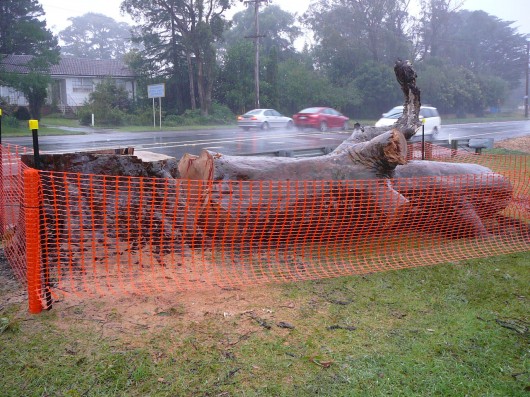 The trunk of a healthy 300+ year old Angophora lies beside the highway in Bullaburra
Blue Mountains, New South Wales, Australia
[Photo by our investigator, 20130403, Photo © ^Creative Commons]
The trunk of a healthy 300+ year old Angophora lies beside the highway in Bullaburra
Blue Mountains, New South Wales, Australia
[Photo by our investigator, 20130403, Photo © ^Creative Commons]
.
Government destruction of Bullaburra has begun. Last Monday, April Fools Day 2013, they came and killed Bullaburra’s magificent Angophora to make way for a trucking expressway through the village. But who are the fools who destroy our native heritage?
To many perhaps this is just another tree. Some people value trees and ecology. Others have deep value for wildlife and other animals, especially their pets. Many people value where they live and grow very attached to where they live for reasons that can seem difficult for others to appreciate. But it is the existence rights of species that humans ignore besides their own self-serving interests. Male Baby Boomers remain the most extreme in their self-righteousness, and those in government prescribe utilitarian dictates over the rights of the few.
Elie Wiesel, novelist, political activist, and Humanities Professor at Boston University, has said that the opposite of love is not hate, it’s indifference. The opposite of beauty is not ugliness, it’s indifference. The opposite of faith is not heresy, it’s indifference. And the opposite of life is not death, but indifference between life and death.
.
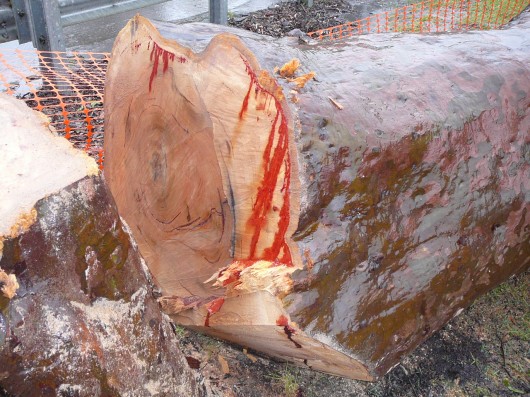 Witnessing an old friend being slaughtered
[Photo by our investigator, 20130403, Photo © ^Creative Commons]
Witnessing an old friend being slaughtered
[Photo by our investigator, 20130403, Photo © ^Creative Commons]
.
A native tree that once was part of an Angophora (Sydney Redgum) forest, existed way back when the three explorers Lawson, Wenthworth and Blaxland crossed the Blue Mountains in 1813. They would have passed right past this tree. Two years later road builder William Cox similarly would have laid his rough track, and in 1836 Major Mitchell upgrading the road too would have passed by this tree. For nearly two centuries travellers have passed by this tree, most probably not even giving it a glance. Now it is gone and the opportunity to respect and appreciate this remnant of natural heritage has gone with it.
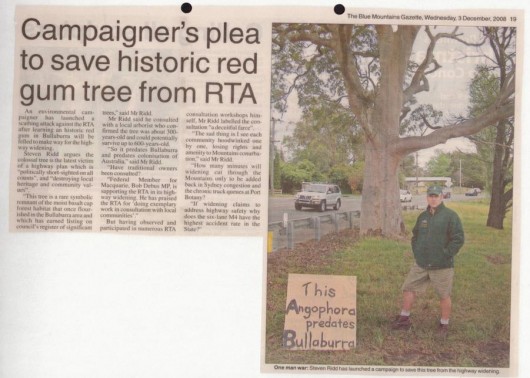 We tried to save you
Campaign to Save Bullaburra’s 300 year old Angophora back in 2008
(Blue Mountains Gazette, 20081203)
We tried to save you
Campaign to Save Bullaburra’s 300 year old Angophora back in 2008
(Blue Mountains Gazette, 20081203)
.
Last January, spiteful people set fire to two Hermmansburg ghost gums made famous in Albert Namatjira’s landscape paintings. In 2006, Barcaldine’s famous ghost gum, ‘the tree of knowledge’ was poisoned. Just last week an old gum tree in the Rylstone public school was poisoned. Human hate for native trees has pervaded Australian colonising society since Cook landed at Camp Cove and chopped down trees for firewood.
.
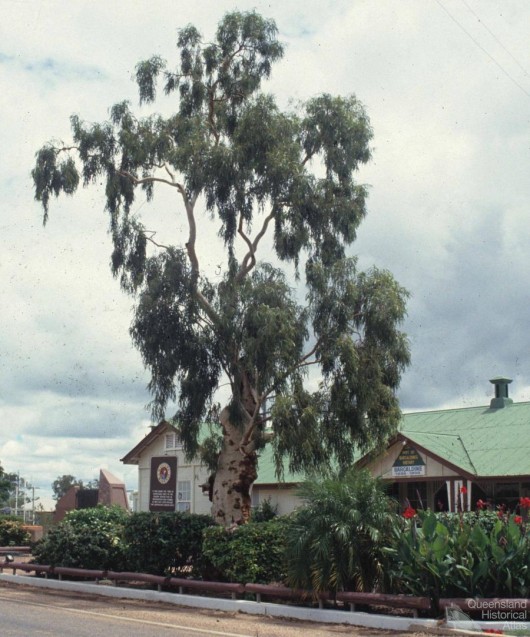 Tree of Knowledge, Barcaldine, Queensland
As it used to be, before it was poisioned.
[Source: Queensland Historical Atlas, 1991,
^http://www.qhatlas.com.au/photograph/tree-knowledge-barcaldine-1991]
Tree of Knowledge, Barcaldine, Queensland
As it used to be, before it was poisioned.
[Source: Queensland Historical Atlas, 1991,
^http://www.qhatlas.com.au/photograph/tree-knowledge-barcaldine-1991]
.
A local arborist with expertise in native trees of the Blue Mountains including Angophoras, estimated in 2007 that the Bullaburra Angophora to have been over 300 years old. It was still healthy and still growing as confirmed by the solid core of the severed trunk.
Now it lies like a dead harpooned whale like roadkill beside the highway, where it has stood all those decades.
.
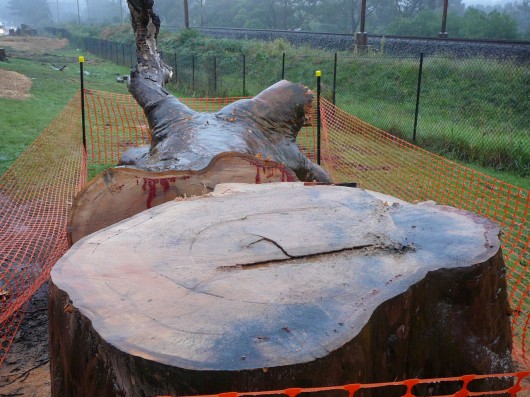 A dendrochronology of more than 300 annual growth rings.
The tree was healthy to the core. It was not rotting. It was not diseased.
It was just in the way of someone’s trucking interpretation of ‘progress’.
[Photo by our investigator, 20130403, Photo © ^Creative Commons]
A dendrochronology of more than 300 annual growth rings.
The tree was healthy to the core. It was not rotting. It was not diseased.
It was just in the way of someone’s trucking interpretation of ‘progress’.
[Photo by our investigator, 20130403, Photo © ^Creative Commons]
.
Significant Tree #29
.
This Angophora was recognised as a ‘Significant Tree‘ on the local Blue Mountains Council’s Significant Tree Register back on 17th July 1985 and formally adopted on 21st June 1988, at the time of Australia’s Bicentennary.
No opposition against killing the tree was communicated by the Blue Mountains Council to the RTA-come-RMS. Indeed, this is one of many such ‘significant trees’ that have been killed for development convenience in recent years. Clearly, the Blue Mountains Council’s Significant Tree Register has become disingenuous and lying greenwash.
.
.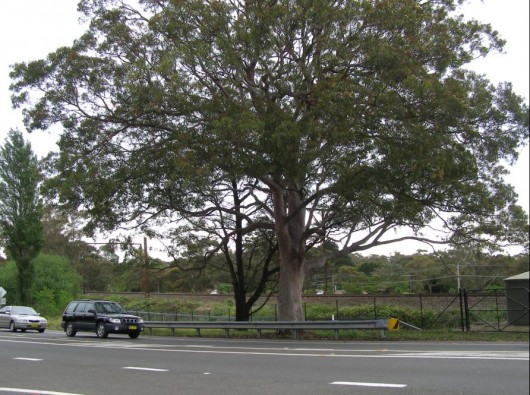 Bullaburra’s Angophora, in memoriam
Bullaburra’s Angophora, in memoriamRegistered Significant Tree #: 29
Botanical Name: Angophora costata (Smooth Barked Apple, Red Gum)
Location: Great Western Highway Bullaburra, Opp. Lot 173, DP13407 [Photo by Editor, 20071028, Photo © ^Creative Commons]
.
Trucking Expressway
.
The death of the Angophora is the begining of the end of Bullaburra. The highway village is set to become a siding for four-laned trucking expressway so that B-double trucks can rumble 24/7 through Blue Mountains towns and villages, nudging 90kph on cruise control.
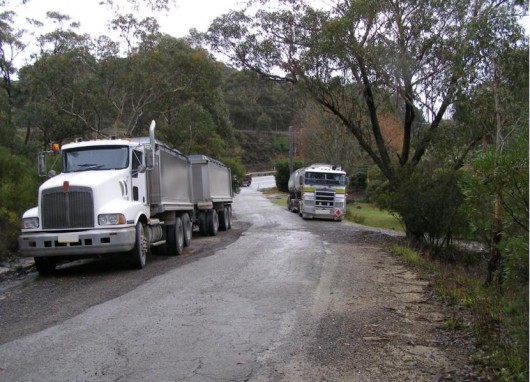 Bigger Trucks demanding bigger roads
[Photo by Editor, 20090531, Photo © ^Creative Commons]
Bigger Trucks demanding bigger roads
[Photo by Editor, 20090531, Photo © ^Creative Commons]
.
The rural amenity of this highway village is to be lobotomised into a mono-design urban landscape taking on the same monotonous blandness as any other expressway in the country. The government euphemises this as:
.
“to achieve greater consistency in the design of the Blue Mountains area to achieve a simple and unified design of the highway and its elements.”
.
The fundamental basis for the government’s conversion of this regional highway into a national trucking expressway route is simply “to improve travel times” for trucks, so that more and larger trucks are encouraged to use the route.
The Bullaburrra section is to cost taxpayers $80 million and will see 3.6 hectares of native bushland destroyed on the basis that the vegetation “is already dissected and fragmented“. So it seems that moral relativism allows for wedge development just like a little bit of corruption doesn’t hurt anyone.
But as if the twisted morality isn’t bad enough. It is the greenwashing that really twists the knife in. The RTA-come-RMS in its Review of Environmental Effects maintains that the expressway development aims:
“to protect the natural systems and ecology of the corridor”
..
[Source: ‘The Great Western Highway Upgrade – Bullaburra East, Review of Environmental Effects’, Vol.2, July 2009, Roads and Traffic Authority, New South Wales Government, p.2.].
However, the expressway development will simply result in the heart of rural Bullaburra being ripped out and the amenity reduced to a trucking siding adopting a benale concrete landscape akin to the bland urban character of an upper Blaxland, and mirroring what has happened to nearby lobotomised Lawson.
.
“It’s just really tragic after all the horrors of the last 1,000 years we can’t leave behind something as primitive as government sponsored execution.”
~ Wisconsin Senator Russ Feingold, when introducing a bill that would end the death penalty on the Federal level.
.
Progress of Hate
.
Under Australia’s Federal Auslink Policy the national freight thinking is road-centric and all about replacing real trains with road trains. Behind this trucking expressway scheme is a powerful and influential trucking lobby group who donate generously to the political parties that control the New South Wales Government, and various politicians including retired Blue Mountains MP Bob Debus, who has long been a driver of this trucking expressway.
The New South Wales Government department behind this scheme is the RTA-come-RMS (Roads and Maritime Services). In 2007, the then General Manager – Environmental Branch, Ms Erica Adamson, claimed that to retain the Angophora consequential loss of tree roots and pruning would instigate the decline of the tree. “For road construction and safety reasons the tree will have to be removed…to maintain sight lines (for speeding trucks).”
“It’s called progress” they say. For the Blue Mountains it is being inflicted at any cost – economic, social, environmental.
The idea of ‘progress‘ is an economic one that was borne out of Western 18th Century hard-nosed Industrial Revolution and perhaps extending back to the 16th Century Enlightenment of Europe and perhaps even back to when the Iron Age triumphed so aggressively and effectively over the Bronze Age.
Perhaps progress remains subjective only with the progressor who doggedly in his pursuit rough shods over others in the process. Perhaps the idea of progress is a myth. Is the human condition better off as a result? Are we advancing as a society by rough shodding over others and over what is left of Ecology and Nature? The philosophy of ‘^Deep Ecology‘ posits otherwise.
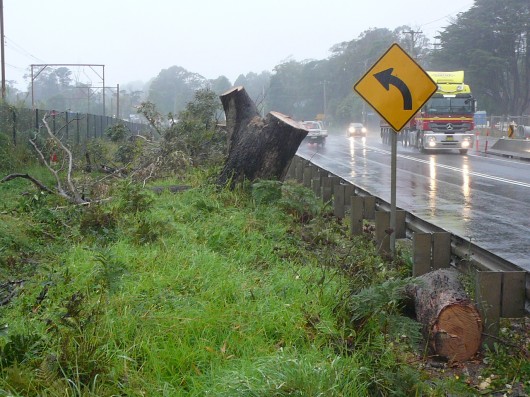 Progress of Hate
[Photo by our investigator, 20130403, Photo © ^Creative Commons]
Progress of Hate
[Photo by our investigator, 20130403, Photo © ^Creative Commons]
.
“Progress means getting nearer to the place you want to be. And if you have taken a wrong turning, then to go forward does not get you any nearer. If you are on the wrong road, progress means doing an about-turn and walking back to the right road; and in that case the man who turns back soonest is the most progressive man.”
~ C.S. Lewis, Mere Christianity
.
Related reading on this website:
.
[1] >Threats from Road Making – articles
.
[2] >Bushphobia – a case of deluded convenience
.
Tags: Blue Mountains, Blue Mountains Council, BMCC, Bullaburra, Bullaburra Angophora, Bullaburra's Angophora, ghost gums, Great Western Highway, greenwash, RMS, Roads and Maritime Services, RTA, RTA-come-RMS, Significant Tree, Significant Tree Register, Tree of Knowledge, trucking expressway


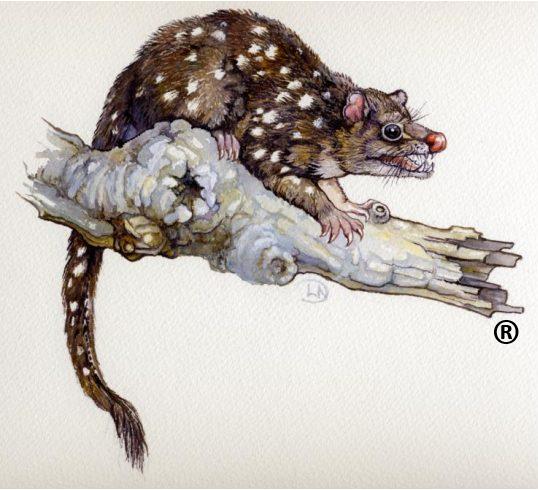
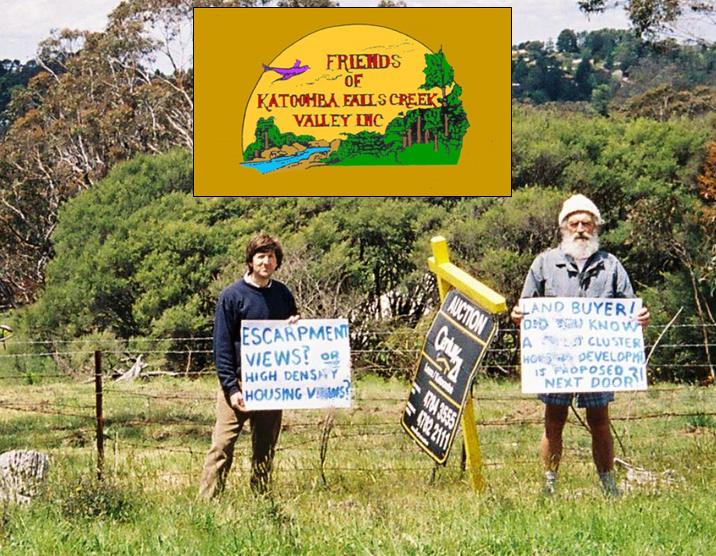

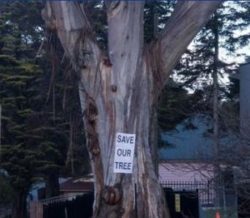
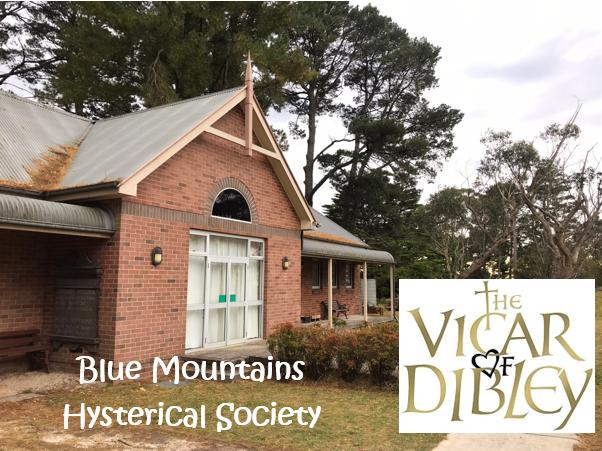

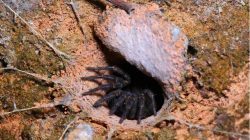

This wanton destruction of old trees and the natural environment is criminal and yet it is permitted by existing laws showing that there is an urgent need for change.
I fully agree with the article that “human hate for native trees has pervaded Australian colonizing society since Cook landed at Camp Cove and chopped down trees for firewood”. This hatred is evident from the ease with which we decide to chop down such old trees as the Bullaburra’s Angophora, Bendigo district’s 200 odd years old Ironbark, Yellowgums and Boxes to make way for freeways, bypasses and road safety for speeding cars as well as from the preferential treatment of exotic trees such as elms in heritage classifications, protection and care.
The tragic loss of the Angophora is compounded by the reality that the material gains from its destruction is blinding us to the reality that in the process of achieving it we are destroying the very environment on which our existence depends.
I thank The Habitat Advocate for campaigning against this carnage. The hatred of Australian flora and fauna and consequences of their replacement is well covered in Deborah Bird Rose’s book “Report from a Wild Country, ethics for decolonization” and William R. Catton’s “Overshoot, the Ecological Basis of Revolutionary Change”.